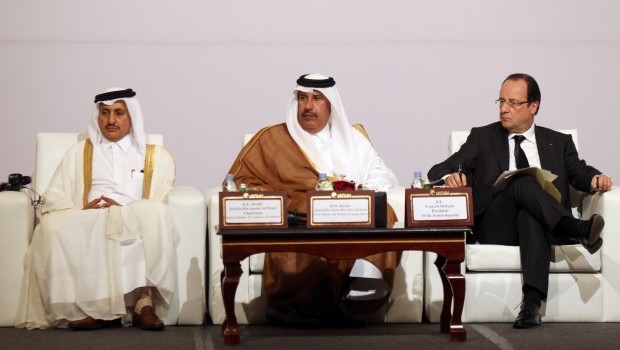
From left: Sheikh Khalifa bin Jassim bin Mohammed Al Thani, chairman of the Qatari Chamber of Commerce and Industry; Qatari Prime Minister and Foreign Minister Hamad bin Jassim Al Thani; French President Francois Hollande at the the Qatari-French Business Forum in Doha, Qatar, Sunday, June 23, 2013. (AP Photo/Osama Faisal)
Business ties between cash-strapped France and gas-rich Qatar have deepened in the past five years as the euro zone’s second biggest economy behind Germany has overcome instincts for economic patriotism to welcome inward investment in areas ranging from sports to real estate and infrastructure.
But a plan for Qatar to pump EUR 50 million into businesses in the suburbs had proved divisive, when they were first floated, with critics concerned that the Gulf state might exercise too much influence and prompting former president Nicolas Sarkozy to put them on hold until after the May 2012 election.
The new Socialist government, facing rising unemployment and stalled economic growth, then came up with a compromise for a mixed Qatari-French fund aimed at small and medium-sized businesses and a memorandum of understanding was signed in November 2012.
“We do not refuse Qatari investments in France but we say there are conditions to meet, areas to focus on and rules to explain,” Hollande said during a visit to Qatar.
“I said that it was best to create a joint investment fund with Qatari and French funds to help small- and medium-sized companies,” he added.
The new fund would not target specific geographical areas in France nor specific company profiles but will also be available for companies in “our suburbs,” Hollande said.
The fund will be operational from July, said Jean-Pierre Jouyet, the head of French state-owned bank Caisse de Depots, which is co-shareholder of the fund with Qatar’s sovereign fund Qatar Holding LLC.
There was little reaction when Qatar bought minority stakes in French infrastructure firm Veolia and builder Vinci , while sports fans cheered the purchase of football club Paris St. Germain by its sovereign wealth fund.
The loudest criticism to the idea of a Qatari fund for French suburbs came from far-right leader Marine Le Pen, who had alleged that Qatar was only investing in areas heavily populated by immigrants to spread Islamic ideas among Muslim youths.
However, left-wing politicians and commentators in newspapers and on television also said that France should be wary of signing deals with a monarchy that shared few of its ideas about democracy and could be seeking to buy influence due to France’s seat on the United Nations Security Council.
